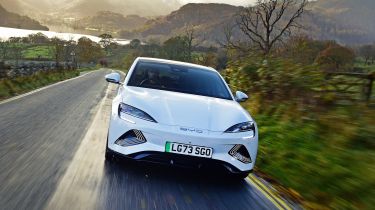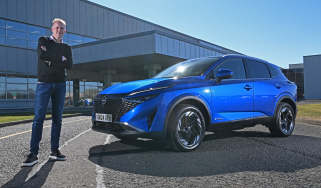BYD Seal - Electric motor, drive and performance
The BYD Seal has all the power you’d need, while the ride and handling balance is biased towards comfort

Underpinning the BYD Seal is the same e-Platform 3.0 used on the existing BYD Atto 3 SUV and BYD Dolphin supermini, upscaled for the saloon’s extra length. It’s the first of BYD’s Brit-bound models to switch from front to rear-wheel drive, though you can get a top-spec Excellence version with an additional motor on the front axle to make the Seal four-wheel drive.
| Model | Power | 0-62mph | Top speed |
| Seal Design | 308bhp | 5.9 seconds | 111 mph |
| Seal Excellence AWD | 523bhp | 3.8 seconds | 111mph |
What is the BYD Seal like to drive?
In town
Thanks to its standard adaptive suspension, the four-wheel drive car feels like the most focused Seal to drive. At low speeds, there’s a slight chatter from the ride around town, but this settles at higher speeds, where the fancier suspension does a much better job of disguising the Seal's mass than the passive set-up of the rear-wheel drive Seal.
Around town, we prefer the regenerative braking set-up you’ll find in the Hyundai Ioniq 6, which uses paddles behind the steering wheel so you can select between varying strengths of regeneration, from a coasting mode for motorway driving up to a one-pedal drive mode for driving in stop/start city traffic. The system in the Seal is too subtle, making it difficult to bring the car to a halt just by lifting off the accelerator pedal.
On A- and B-roads
The latter version is softer and less controlled than the BMW i4 over lumpy B roads, and isn’t as satisfying to drive as a result. Both versions of Seal have fairly pronounced body lean in corners when pushing on, and an intrusive stability control system curtails any attempt to drive enthusiastically. Still, with weighty steering and a low driving position, the Seal is unquestionably the brand’s most driver-oriented car to date.
The BYD Seal is a quick car, though The entry-level 308bhp rear-wheel-drive model provides all the performance you’d need, while the flagship four-wheel drive Excellence model ups the ante to 523bhp. However, both versions suffer from a less responsive accelerator than rivals, giving the feeling of old-school turbo lag when trying to make a spirited getaway from the lights, and blunting the feeling of punchy acceleration we’ve come to expect from high-performance EVs.
The main difference between the entry Seal Design and the flagship Excellence AWD is the additional electric motor powering the front wheels to give the Seal four-wheel drive. The system utilises BYD’s Intelligent Torque Adaption Control (iTAC) system, which is, in effect, a torque-vectoring set-up that aims to reduce slip and increase traction in slippery conditions. We found that the four-wheel drive provided plenty of traction, even in some of the worst weather the north of England could throw at us. In the end, we’d still recommend the standard rear-wheel drive model, because it’s perfectly capable of handling most needs and situations.
On the motorway
The BYD isn’t as quiet as the i4 at higher speeds, even though the side windows of the Seal are laminated to dampen wind noise at higher speeds.
We also think the Seal’s brakes could use a little more initial bite, especially given that the Seal is a heavy car with a lot of mass to slow down. The pedal travel is long, and there’s a distinct step between the regenerative braking system and the mechanical braking system.
0-62mph acceleration and top speed
The entry-level rear-wheel drive SEAL gets from 0-62mph in just 5.9 seconds, which is faster than the equivalent BMW i4 eDrive30 and Tesla Model 3 RWD, providing more than enough performance to make it our preferred version of Seal.
The top-of-the-range Excellence AWD model officially takes 3.8 seconds to get from 0-62mph, but we recorded a 3.7-second sprint using its dedicated launch control mode on a closed track. It’s no faster flat-out than the rear-wheel drive model, with both versions hitting 111mph.








